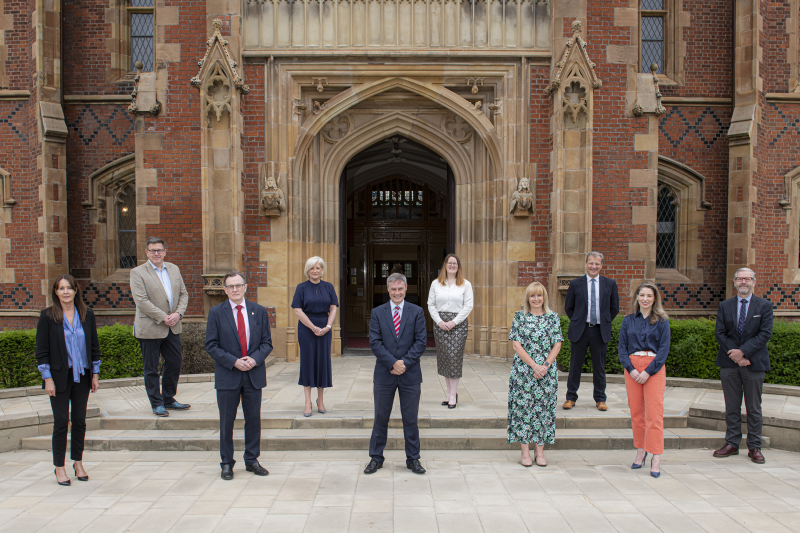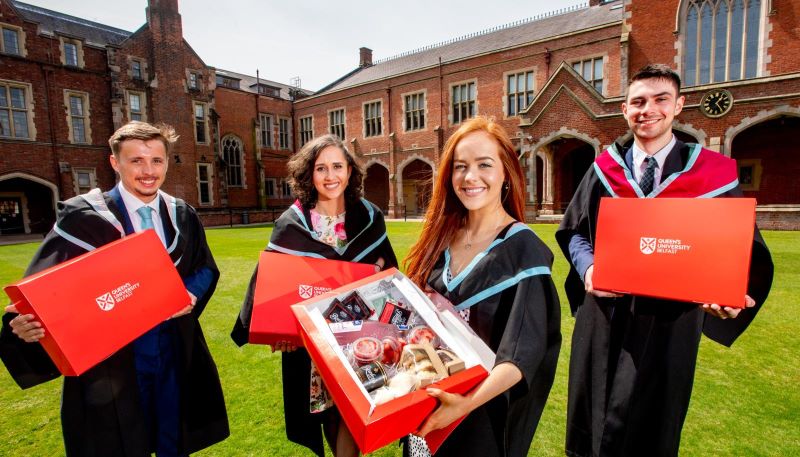Vice-Chancellor's Update - July 2021
As the 2020-21 academic year draws to a close, I would like to thank you all for your efforts and commitment during the year.

COVID-19 has provided the backdrop to many of our activities this year, including the development of our new Strategic Plan. Over the past 18 months, we have been working with staff, students and external stakeholders to develop our new Strategic Plan to 2030 which sets out the key role Queen’s will play in the social and economic recovery of Northern Ireland, post-pandemic. I am extremely grateful to those who shared their feedback, comments and insight as part of the engagement process. Your input has been invaluable in helping to shape the direction of our new Strategy.
Last week, Senate, our Governing Body, endorsed Strategy 2030, Delivering for our Future, which sets out our ambition for the next ten years. The new Strategy is centred around our people and focuses on four strategic priorities, which when fully implemented, will help us realise our ambition to be ranked in the top 175 universities in the world. The strategic priorities are:
- Education and Skills
- Research and Innovation
- Global Reputation and Partnerships
- Social and Civic Responsibility, and Economic Prosperity
Further information on the strategic priorities and supporting enablers is available on the Strategy 2030 website. Although our Strategy reflects a 10-year horizon, the operational delivery will be a rolling three-year approach. Workstreams, consisting of academic and professional support staff, have been exploring programmes of work, projects and initiatives to take forward under each of the strategic priorities and enablers. Further details on these will be made available in due course. In the meantime, I would like to thank you once again for helping to develop Strategy 2030 and I look forward to working with you all to deliver it.
As a University community, we have faced many uncertainties over these past 15 months, and I remain immensely proud of the way our staff and students have worked together to help shape our response to the challenges of COVID-19. With the improving public health context, we are now working on the assumption that face-to-face teaching delivery will resume for all programmes, in September 2021, subject to Public Health and NI Executive Guidance. Whilst we are optimistic around arrangements for September, it is important to highlight that the public health context can change rapidly, and we will remain prepared to amend our plans if the public health situation requires us to do so.
Whilst opportunities for face-to-face engagement remain limited, I was delighted to welcome a small number of guests to our first in-person and socially distanced Chief Executives’ Club event a couple of weeks ago. Hosted by Aflac NI, a leading insurance provider in the United States and Japan which now has a Global IT and Cybersecurity Innovation Centre in Belfast, we were delighted that the new Economy Minister, Mr Paul Frew MLA was able to join us at this event, during his first week in office. Minister Frew has since visited us on campus to attend a meeting of Queen's Employers Forum where he briefed members on the Department's Economic Vision for Northern Ireland and discussed the importance of skills and innovation.

Minister Frew pictured with Vice-Chancellor Professor Ian Greer and members of Queen's Employers Forum
Other public figures participating in recent events at Queen's included former First Minister, Arlene Foster, Deputy First Minister, Michelle O’Neill and interim Head of the NI Civil Service, Jenny Pyper, who took part in a virtual discussion on Women in Leadership, hosted by the Chief Executives’ Club and chaired by Director of the Queen’s Gender Initiative, Professor Karen McCloskey. We also welcomed Mr Kevin Foster MP, Minister for Future Borders and Immigration to the Wellcome-Wolfson Institute for Experimental Medicine recently. He had the opportunity to meet with staff and students and our incoming Students’ Union President, hearing first-hand the experiences of international staff and students on relocating to Belfast.
We learnt last month that the Queen’s Management School has been awarded the prestigious and internationally recognised EQUIS accreditation for management and business schools. This is an outstanding achievement for the School and is a testament to the hard work of many colleagues. The School is one of just 197 business and management schools worldwide to have been awarded EQUIS accreditation to date. In other good news, Professor Danny McAuley has been elected a Fellow of the Academy of Medical Sciences while Professor Janice Carruthers and Professor Richard Schoch, both from the School of Arts, English and Languages, have also been elected as members of the Royal Irish Academy and were formally admitted at a virtual ceremony in May. This follows the news earlier in the year that Professor Joanne Hughes was elected to the Academy of Social Sciences, the national academy of academics, learned societies and practitioners in the social sciences.
As the pandemic continues to impact our lives in many ways, I am extremely proud of the role that so many Queen’s staff are playing, with research undertaken at Queen’s informing global debates around the impact of COVID-19. Key projects include:
- Researchers in the School of Nursing and Midwifery assessing the impact on those with care and support needs, exploring the experiences of families across the UK and Ireland to understand the challenges they have faced during the COVID-19 pandemic.
- The Language Trends Northern Ireland 2021 report by the Northern Ireland Centre for Information on Language Teaching and Research and our School of Social Sciences, Education and Social Work which found that COVID-19 has had a ‘big impact’ on language lessons – with 43 per cent of teachers surveyed reporting that language teaching was ‘severely disrupted’ by the pandemic.
- An international study on COVID-19 Antibody Response in Cystic Fibrosis (CAR-CF) to be carried out by a team from the Wellcome-Wolfson Institute for Experimental Medicine. This will measure COVID-19 antibody levels in thousands of people with cystic fibrosis across 17 European countries and is funded by a $1.5m grant from the CF Foundation (US) over a two-year period. The project will also run in Canada and the US, making the research the largest prospective study in cystic fibrosis (CF) to have been carried out to date.
- Researchers working on the Northern Ireland Cohort for the Longitudinal Study of Aging (NICOLA Project), from the Centre for Public Health are studying how people aged 50 years and older across Northern Ireland have been affected by the COVID-19 pandemic.
- The Freelancers in the Dark project is a research collaboration between Queen’s, Manchester Metropolitan University and East 15 Acting School at the University of Essex. The research team are investigating the social, cultural, and economic consequences of the COVID-19 pandemic on independent arts workers across England, Scotland, Wales, and Northern Ireland.
Despite the challenges faced by COVID, Queen’s has recorded strong performance on research during the 2020-21 academic year to date (Aug-end May). Applications (£289m) and awards (£72m) rallied strongly, exceeding levels compared to last year and the previous three-year average. Crucially, 54% of awards (£39m) were granted from peer review funding sources (UKRI, EU, Wellcome and Leverhulme), reflecting an increased focus on research quality. This movement towards quality funding sources has led to a corresponding rise in the contribution budgeted on awards to £17.1m (24% of total award value) - the highest value and percentage recorded over the last three years.
As many of you will be aware, Professor Richard English will stand down from his role as a Pro-Vice-Chancellor at the end of August and I would like to pay tribute to Richard for his outstanding leadership over the past five years, which has made a real impact for the University in many key areas such as international partnerships and reputation. The recruitment process for a Pro-Vice-Chancellor for Internationalisation is underway and we aim to secure an appointment early in the new academic year.

At this time of year, Graduation preparations would normally be in full swing, with marquees erected in the Quad and the Whitla Hall being prepared to welcome our Graduates, their families and friends. Whilst it is disappointing that we cannot proceed with in-person graduations this summer, I am delighted that our graduates have been able to borrow gowns, with many having opportunities for photos across campus with friends and family. My thanks to all staff in Student Plus and Estates for facilitating this initiative and to all those staff across Schools and Directorates in organising 22 virtual Graduation events. We still very much hope to organise in-person celebrations for our students who have completed their studies during the pandemic, and I will keep all staff informed on our plans in my regular updates.
It has been a busy year and I know it will continue to be so for many of you over the summer months as we prepare for the start of the new academic year and deal with admissions. I hope that you will have the opportunity for some well-deserved time off and rest over the summer period.